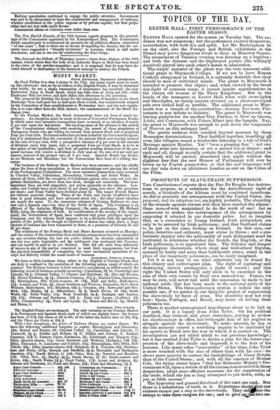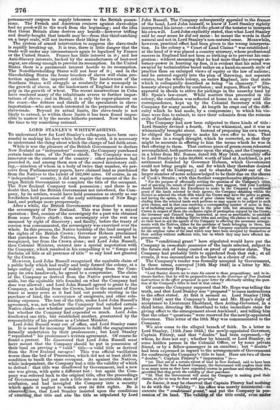PROSPECTS OF SLAVE-TRADE SUPPRESSION. THE Constitutiomiel reports that the Duc
De Broglie has instruc- tions to propose, as a substitute for the Anti-Slavery right of search, a blockade of the African coast by combined squadrons. As this is precisely- our arrangement with the United States, the proposal, and its adoption too, are highly. probable. The absurdity of the crusade against slavers Will then have reached the climax : three men-of-wax maintained to do the work of one I Let us endeavour to realize the extravagance of the arrangement by supposing it adopted in our domestic police. Let us imagine that, as a concession to Young Ireland, Irish pickpockets are only to be arrested by Irish policemen ; and that Scotland claims to be put on the same footing as Ireland. In that case, our police, detective and ordinary, must cruise in threes ; and a pre- liminary- in. quiry into to the nationality of each delinquent must be instituted, to determine whether the Scotch, the English, or the Irish policeman' is to apprehend him. The delicacy and danger of analogous discussions, where stout and well-armed frigates, manned by hardy and more than half-hostile crews, stand in the place of our imaginary policemen, can be easily imagined. Yet it is not easy to see what substitute can be found for this clumsy and extravagant plan. The right of capturing and destroying slavers presupposes a right of search - and this right the United States will only allow to be exercised in the case of their own vessels by their own men-of-war. France, we may be sure, will never rest, until the concession be made to her national pride that has been made to the national pride of the United States. The three-policemen system is indeed the only possible one, if we persist in our Quixotic project of suppressing the slave-trade by force of arms. The absurdity may not stop here: Spain, Portugal, and Brazil, may insist on having their policemen too. There is another cross-grained impediment about to be laid in our path. It is a legacy from John Tyler. On his political deathbed, that virtuous and great statesman, passing in review his shortcomings in office, has bethought him of his neglect to struggle against the slave-trade. To make amends, he has at the-last moment caused a searching inquiry to be instituted by- his agents in Brazil into the way in which it is carried on. The investigation ;las not added much to our previous knowledge ; but it has enabled John Tyler to devise a plan for the "better sup- pression of the slave-trade and bequeath it to the heir of his honours. Like many other "convertites" of his class, John Tyler is more touched with the sins of others than with his own—he shows more anxiety to correct the backslidings of Great Britain than of the United States ; and, with all the emotion of Mother Cole, the dying sinner hopes "that her Britannic Majesty's Go- vernment will, upon a review of all thecircumstanceti stated in these despatches, adopt more efficient measures for the suppression of the trade, which she has so long attempted to put down, with, as yet, so little success."
The hypocrisy and general falsehood of this cant are rank. But there is a substratum of truth in it. Experience shot rat our w
tog cruisers cannot put a stop to the slave-trade. They onl rce the crimps to take three cargoes for one ; and to give up.. e two 1311.•
pernumerary cargoes to supply labourers to the British posses- sions. The French and American cruisers against slave-ships had no good-will to tile work from the beginning ; and the idea that Great Britain alone derives any benefit—however trifling and dearly-bought that benefit may be—from this thief-catching on a large scale, will not increase their liking for it.
The system of armed intervention to suppress the slave-trade is rapidly breaking up. It is true, there is little danger that the trade will under any circumstances again be legalized by France or the United States. France has little interest in it ; and her Anti-Slavery interests, backed by the manufacturers of beet-root sugar, are strong enough to prevent its resumption. In the United States there is a paramount interest hostile to its resumption. The NontSlaveholding States will not hear of it ; and in the Slaveholding States the home breeders of slaves will claim pro- tection against the imported article. The landowners of the Southern States will struggle as resolutely for a monopoly in the growth of slaves, as the landowners of England for a mono- poly in the growth of wheat. The recent insurrections in Cuba have rendered many of the inhabitants averse to further impor- tations of slaves; and in Brazil, it is only the sugar-planters on the coast—the debtors and thralls of the speculators in slave- importation—who are much interested in the perpetuation of the slave-trade. Beyond its actual limits, the slave-trade is not likely to extend, as within those limits it has been found impos- sible to narrow it by the means hitherto pursued. Now would be the time to try something rational.



























 Previous page
Previous page